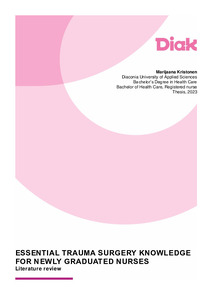ESSENTIAL TRAUMA SURGERY KNOWLEDGE FOR NEWLY GRADUATED NURSES
Kristonen, Marijaana (2023)
Kristonen, Marijaana
2023
All rights reserved. This publication is copyrighted. You may download, display and print it for Your own personal use. Commercial use is prohibited.
Julkaisun pysyvä osoite on
https://urn.fi/URN:NBN:fi:amk-2023060923348
https://urn.fi/URN:NBN:fi:amk-2023060923348
Tiivistelmä
ABSTRACT
Marijaana Kristonen
Essential trauma surgery knowledge for newly graduated nurses 45 pages and 1appendix
Spring 2023
Diaconia University of Applied Sciences
Bachelor’s Degree in Health Care
Bachelor of Health Care, Registered nurse
High quality in trauma surgery care relies on nurses’ good knowledge, experience and skills. However, the question that remains is: how can newly graduated nurses become competent, and what are the effective methods and strategies for supporting them? The aim of this literature review is to describe various effective methods and approaches for acquiring competence in trauma surgery care.
A systematic search of relevant articles was conducted in the following databases - Sage, ScienceDirect, CINAHL and PubMed, focusing on two key themes: approaches for developing competencies in trauma surgery care for newly graduated nurses and support strategies for them. From the results, 15 articles were selected as most relevant to the research questions.
Newly graduated nurses in trauma surgery face many challenges. They must quickly gain a broad range of technical and non-technical skills, as well as the ability to work effectively within complex healthcare teams, to provide safe and effective patient care. However, these nurses often report feeling unprepared for their roles, highlighting a critical gap in their education and training. Therefore, it is important to identify effective strategies to support the development of competencies in the field of trauma surgery care.
The results of the literature review present strategies and approaches to develop competencies in trauma surgery for newly graduated nurses. The analysis categorizes these strategies into themes and categories, yielding 5 main themes, 7 categories, and 14 subcategories. These are broadly classified into the areas of Continuous Learning, Interpersonal Skills and Collaboration, Patient-Oriented Practices, Innovation and Technology in Training, and Self-Management and Resilience. In addition, the review identifies support strategies under the themes of Skills Development and Collaboration. The identified methods encompass specialized training, team dynamics, patient care ethics, innovative technologies, emotional intelligence, mentorship, and fostering a collaborative environment. The review suggests that a multifaceted approach incorporating these strategies can equip new nurses with the necessary skills and competencies for effective trauma surgery care. Further research is encouraged to evaluate the efficacy of these strategies in different healthcare contexts and their long- term impact on the nursing profession. By implementing these strategies, healthcare systems can facilitate the transition of new nurses into their roles, ultimately enhancing patient care and outcomes in trauma surgery.
Keywords: newly graduated nurses, trauma surgery care, competency development
Marijaana Kristonen
Essential trauma surgery knowledge for newly graduated nurses 45 pages and 1appendix
Spring 2023
Diaconia University of Applied Sciences
Bachelor’s Degree in Health Care
Bachelor of Health Care, Registered nurse
High quality in trauma surgery care relies on nurses’ good knowledge, experience and skills. However, the question that remains is: how can newly graduated nurses become competent, and what are the effective methods and strategies for supporting them? The aim of this literature review is to describe various effective methods and approaches for acquiring competence in trauma surgery care.
A systematic search of relevant articles was conducted in the following databases - Sage, ScienceDirect, CINAHL and PubMed, focusing on two key themes: approaches for developing competencies in trauma surgery care for newly graduated nurses and support strategies for them. From the results, 15 articles were selected as most relevant to the research questions.
Newly graduated nurses in trauma surgery face many challenges. They must quickly gain a broad range of technical and non-technical skills, as well as the ability to work effectively within complex healthcare teams, to provide safe and effective patient care. However, these nurses often report feeling unprepared for their roles, highlighting a critical gap in their education and training. Therefore, it is important to identify effective strategies to support the development of competencies in the field of trauma surgery care.
The results of the literature review present strategies and approaches to develop competencies in trauma surgery for newly graduated nurses. The analysis categorizes these strategies into themes and categories, yielding 5 main themes, 7 categories, and 14 subcategories. These are broadly classified into the areas of Continuous Learning, Interpersonal Skills and Collaboration, Patient-Oriented Practices, Innovation and Technology in Training, and Self-Management and Resilience. In addition, the review identifies support strategies under the themes of Skills Development and Collaboration. The identified methods encompass specialized training, team dynamics, patient care ethics, innovative technologies, emotional intelligence, mentorship, and fostering a collaborative environment. The review suggests that a multifaceted approach incorporating these strategies can equip new nurses with the necessary skills and competencies for effective trauma surgery care. Further research is encouraged to evaluate the efficacy of these strategies in different healthcare contexts and their long- term impact on the nursing profession. By implementing these strategies, healthcare systems can facilitate the transition of new nurses into their roles, ultimately enhancing patient care and outcomes in trauma surgery.
Keywords: newly graduated nurses, trauma surgery care, competency development
